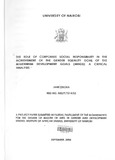| dc.description.abstract | The achievement of gender equality is paramount to the achievement of
development. However, according to the 2003, Millennium Development
Goals progress report for Kenya, the achievement of the gender equality
goal of the MDGs is still far from being realized. Gender inequality still
persists. There is no region in Kenya where women are equal to men in
legal, social and economic rights. Glaring gender gaps exist in access to
and control of resources, in economic opportunities and in power and
political voice. Overall, women continue to have less access to social
services and productive resources than men.
This study aimed at describing the nature of CSR activities in Kenya and
show how these activities contribute towards the achievement of the
gender equality goal of the MDGs. It examined the various CSR activities
of various organizations and sought to place these activities into each of
the MDGs so as to bring out their contribution to the achievement of
gender equality.
10 companies within a radius of 20 km from KICC were chosen for this
study. The area was chosen due to the fact that it has representation of
many companies that are engaged in CSR activities and also because of
its proximity and accessibility. Companies were chosen based on their
CSR record and willingness to provide information. Interviews were
carried out for CSR officers of companies and representatives of
communities that have benefited from CSR activities. Self administered
questionnaires were also filled by some CSR officers. Both qualitative and
quantitative techniques were used.
Key findings indicate that companies are involved in various CSR activities
including poverty eradication, education, health and environmental
sustainability. However, these activities are not carried out with focus on
the MDGS. Furthermore, there is little evidence that these activities are
geared towards the achievement of the gender equality goal. What is
evident is that companies are supporting certain activities for girls,women
or women groups, the gender recovery centre specifically but not within
the broader goal of achieving gender equality. The aims and goals of
their CSR efforts are to enhance their profile and ultimately to improve
profitability. | en |

